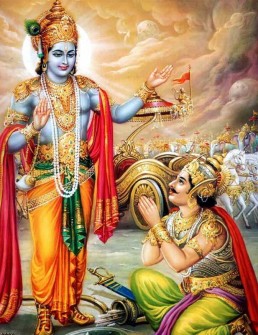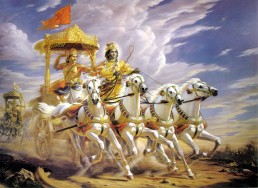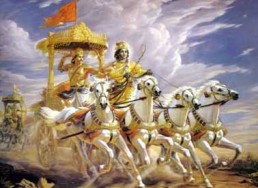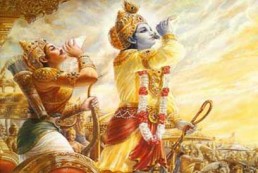Bhagavad Gita-Chapter 8 All Verses with Meaning and Audio
किं तद् ब्रह्म किमध्यात्मं किं कर्म पुरुषोत्तम ।
अधिभूतं च किं प्रोक्तमधिदैवं किमुच्यते ॥ ८-१॥
kiṃ tad brahma kimadhyātmaṃ kiṃ karma puruṣottama
adhibhūtaṃ ca kiṃ proktamadhidaivaṃ kimucyate 8-1
प्रयाणकाले च कथं ज्ञेयोऽसि नियतात्मभिः ॥ ८-२॥
prayāṇakāle ca kathaṃ jñeyo’si niyatātmabhiḥ 8-2
अक्षरं ब्रह्म परमं स्वभावोऽध्यात्ममुच्यते ।
भूतभावोद्भवकरो विसर्गः कर्मसंज्ञितः ॥ ८-३॥
akṣaraṃ brahma paramaṃ svabhāvo’dhyātmamucyate
bhūtabhāvodbhavakaro visargaḥ karmasaṃjñitaḥ 8-3
अधियज्ञोऽहमेवात्र देहे देहभृतां वर ॥ ८-४॥
adhiyajño’hamevātra dehe dehabhṛtāṃ vara 8-4
यः प्रयाति स मद्भावं याति नास्त्यत्र संशयः ॥ ८-५॥
yaḥ prayāti sa madbhāvaṃ yāti nāstyatra saṃśayaḥ 8-5
तं तमेवैति कौन्तेय सदा तद्भावभावितः ॥ ८-६॥
taṃ tamevaiti kaunteya sadā tadbhāvabhāvitaḥ 8-6
मय्यर्पितमनोबुद्धिर् र्मामेवैष्यस्यसंशयम् ॥ ८- ७॥
mayyarpitamanobuddhir māmevaiṣyasya saṃśayaḥ 8-7
परमं पुरुषं दिव्यं याति पार्थानुचिन्तयन् ॥ ८-८॥
paramaṃ puruṣaṃ divyaṃ yāti pārthānucintayan 8-8
मणोरणीयंसमनुस्मरेद्यः ।
सर्वस्य धातारमचिन्त्यरूप-
मादित्यवर्णं तमसः परस्तात् ॥ ८-९॥
maṇoraṇīyaṃsamanusmaredyaḥ
sarvasya dhātāramacintyarūpa-
mādityavarṇaṃ tamasaḥ parastāt 8-9
भक्त्या युक्तो योगबलेन चैव ।
भ्रुवोर्मध्ये प्राणमावेश्य सम्यक्
स तं परं पुरुषमुपैति दिव्यम् ॥ ८-१०॥
bhaktyā yukto yogabalena caiva
bhruvormadhye prāṇamāveśya samyak
sa taṃ paraṃ puruṣamupaiti divyam 8-10
विशन्ति यद्यतयो वीतरागाः ।
यदिच्छन्तो ब्रह्मचर्यं चरन्ति
तत्ते पदं सङ्ग्रहेण प्रवक्ष्ये ॥ ८-११॥
viśanti yadyatayo vītarāgāḥ
yadicchanto brahmacaryaṃ caranti
tatte padaṃ saṅgraheṇa pravakṣye 8-11
मूर्ध्न्याधायात्मनः प्राणमास्थितो योगधारणाम् ॥ ८-१२॥
mūrdhnyādhāyātmanaḥ prāṇamāsthito yogadhāraṇām 8-12
यः प्रयाति त्यजन्देहं स याति परमां गतिम् ॥ ८-१३॥
yaḥ prayāti tyajandehaṃ sa yāti paramāṃ gatim 8-13
तस्याहं सुलभः पार्थ नित्ययुक्तस्य योगिनः ॥ ८-१४॥
tasyāhaṃ sulabhaḥ pārtha nityayuktasya yoginaḥ 8-14
नाप्नुवन्ति महात्मानः संसिद्धिं परमां गताः ॥ ८-१५॥
nāpnuvanti mahātmānaḥ saṃsiddhiṃ paramāṃ gatāḥ 8-15
मामुपेत्य तु कौन्तेय पुनर्जन्म न विद्यते ॥ ८-१६॥
māmupetya tu kaunteya punarjanma na vidyate 8-16
रात्रिं युगसहस्रान्तां तेऽहोरात्रविदो जनाः ॥ ८-१७॥
rātriṃ yugasahasrāntāṃ te’horātravido janāḥ 8-17
रात्र्यागमे प्रलीयन्ते तत्रैवाव्यक्तसंज्ञके ॥ ८-१८॥
rātryāgame pralīyante tatraivāvyaktasaṃjñake 8-18
रात्र्यागमेऽवशः पार्थ प्रभवत्यहरागमे ॥ ८-१९॥
rātryāgame’vaśaḥ pārtha prabhavatyaharāgame 8-19
यः स सर्वेषु भूतेषु नश्यत्सु न विनश्यति ॥ ८-२०॥
yaḥ sa sarveṣu bhūteṣu naśyatsu na vinaśyati 8-20
यं प्राप्य न निवर्तन्ते तद्धाम परमं मम ॥ ८-२१॥
yaṃ prāpya na nivartante taddhāma paramaṃ mama 8-21
यस्यान्तःस्थानि भूतानि येन सर्वमिदं ततम् ॥ ८-२२॥
yasyāntaḥsthāni bhūtāni yena sarvamidaṃ tatam 8-22
प्रयाता यान्ति तं कालं वक्ष्यामि भरतर्षभ ॥ ८-२३॥
prayātā yānti taṃ kālaṃ vakṣyāmi bharatarṣabha 8-23
तत्र प्रयाता गच्छन्ति ब्रह्म ब्रह्मविदो जनाः ॥ ८-२४॥
tatra prayātā gacchanti brahma brahmavido janāḥ 8-24
तत्र चान्द्रमसं ज्योतिर्योगी प्राप्य निवर्तते ॥ ८-२५॥
tatra cāndramasaṃ jyotiryogī prāpya nivartate 8-25
एकया यात्यनावृत्तिमन्ययावर्तते पुनः ॥ ८-२६॥
ekayā yātyanāvṛttimanyayāvartate punaḥ 8-26
तस्मात्सर्वेषु कालेषु योगयुक्तो भवार्जुन ॥ ८-२७॥
tasmātsarveṣu kāleṣu yogayukto bhavārjuna 8-27
दानेषु यत्पुण्यफलं प्रदिष्टम् ।
अत्येति तत्सर्वमिदं विदित्वा
योगी परं स्थानमुपैति चाद्यम् ॥ ८-२८॥
ॐ तत्सदिति श्रीमद्भगवद्गीतासूपनिषत्सु
ब्रह्मविद्यायां योगशास्त्रे श्रीकृष्णार्जुनसंवादे
अक्षरब्रह्मयोगो नामाष्टमोऽध्यायः ॥ ८॥
dāneṣu yatpuṇyaphalaṃ pradiṣṭam
atyeti tatsarvamidaṃ viditvā
yogī paraṃ sthānamupaiti cādyam 8-28
oṃ tatsaditi śrīmadbhagavadgītāsūpaniṣatsu
brahmavidyāyāṃ yogaśāstre śrīkṛṣṇārjunasaṃvāde
akṣarabrahmayogo nāmāṣṭamo’dhyāyaḥ 8

Description
Bhagavad Gita Chapter 8 Summary
AkṣaraBrahma-yoga – The Imperishable Brahman
The previous chapter concluded by introducing certain technical terms and this one begins with an explanation of those. It then details various spiritual practices undertaken by those who desire to merge with the Supreme. This chapter also describes the two paths followed by the “jiva” after it leaves the body – one being the path of eventual return (to this world) and the other being the path of no return (krama-mukti).
Below are the main themes of Chapter 8:
Verses 1 – 4
Definition of the terms Brahman, adhyātma, karma, adhibūta, adhidaiva and adhiyajña
Verses 5 – 14
The significance and the method of remembering the Lord at the time of death
Verses 15 – 22
Comparison between two types of goals — God and world
Verses 23 – 27
The bright and dark paths
Verses 28
Glory of upāsanā
Gita Chapter 8 – Commentary by Swami Paramarthananda
Background
Lord Krishna concluded the seventh chapter by gloriying jñāni-bhakta as one who knows Brahman, adhyātma, karma, adhibūta and adhiyajña (i.e., the complete nature of God consisting of parā and aparā-prakṛti). He remembers the God at the time of death also.
With the desire to understand the above new terms, Arjuna asks seven questions to Krishna. The eighth chapter begins with these questions — the first six dealing with the six terms beginning with Brahman and the last one dealing with the thought of a person at the time of death (1, 2).
Lord Krishna answers — Brahman is the imperishable Truth, Adhyātma (or ātman) is the same Brahman behind the individual equipments. Karma refers to all actions which are the cause for the birth of all beings (3).
Adhibhūta is the entire perishable, inert universe. Adhidaiva is the Hiraṇyagarbha who blesses all the organs of of all beings. Adhiyajña is the Lord as the presiding deity of all the actions of the individual (4).
From the 5th verse till the end of this chapter, Lord Krishna elaborately answers the last question i.e., how to remember the Lord even at the time of death.
Whatever be the predominant thought pattern at the time of death, that determines the place of the rebirth as well as the type of rebirth (6). Hence, if a person yearns for the Lord at the time of death, his rebirth will be conducive for the pursuit of the Lord in which he will naturally be successful (5). [It is said that those who are saguṇa-upāsakas will go to Brahmaloka. They will attain liberation by gaining knowledge from Brahmā, the creator himself. This is called krama-mukti]. But the thought pattern at the time of the death is determined by the predominant thought pattern throughout one’s life. Hence, Krishna asks to remember God all the time so that we will remember Him at the time of death also (7). Though it may appear difficult, one can succeed in this by constant effort and sincere practice (8).
From the 9th to the 13th verse, Krishna describes elaborately the practice of upāsanā at the time of death. One should control the organs of perception as well as action. Then by the skill of yoga-practice, prāṇa has to be withdrawn (through the suṣumnā-nāḍī) to the top of the head between the eyebrows. Then, he should withdraw the mind back to the heart, its source. With such a mind he should meditate on oṅkāra or any chosen deity with all devotion. He attains God who is omniscient, eternal, the ruler, subtler than the subtlest, the sustainer of all, incomprehensible, effulgent, and beyond ignorance. All scriptures talk about Him alone. All dispassionate seekers reach Him alone. All disciplines are for attaining Him alone. He is the ultimate goal of upāsakas.
For a person who is sincerely committed to the practice of mediation of God and whose devotion is undivided, God is easily attainable (14).
Then the Lord compares two types of goals, i.e., God and the world. Nobody can put the end to the cycle of birth by reaching higher lokas (worlds) or by acquiring better bodies. Even Brahmā, the creator, who has the longest duration of life (his day being two thousand caturyugas) cannot be free from finitude. Then what to talk of all other things and beings which appear during the day of Brahmā and disappear during his night? Hence all the lokas and achievements therein are finite. God is the only eternal and changeless principle who is beyond the unmanifest and manifest creation. He is imperishable and is the supreme goal of life. All beings exist in Him and everything is pervaded by Him. Attaining Him, one does not take rebirth in the mortal world (saṃsāra) (15 to 22).
Thus the Lord established that attainment of God is the highest goal compared to all other achievements. Now Krishna discusses the two paths that lead to the two goals which are subject to non-return and return. An upāsaka attains krama-mukti by departing through the bright-path (śukla-gati) which is presided over by the deities of fire, day, bright-fortnight and uttarāyaṇam. (He goes to Brahmaloka, gains Self-knowledge from Brahmā and becomes liberated.) Ritualists go by the dark-path (Krishna-gati) which is presided over by the deities of smoke, night, dark-fortnight and dakṣiṇāyanam. They come back after enjoying in the heavens (23 to 26).
Since the bright path takes one to God, one should choose that alone. To take to that path one should become an upāsaka. Hence Krishna advises Arjuna to be committed to upāsanā (27).
Concluding the topic, Krishna glorifies the result of upāsanā as superior to all other results gained through all other pursuits. Because, none of them can take one to that goal which the Upasaka attains — the supreme, primal God.
(Upāsanā can take a seeker to Guru and śāstra. Naturally upāsaka becomes jñāni-bhakta. He is liberated in this very life. He has no travel. This aspect (jīvanmukti) was talked in the seventh chapter and will be continued from the ninth chapter.
If upāsanā does not take one to guru and śāstra, he continues to be self-ignorant. He is not liberated in this life. But he travels by the bright-path to Brahmaloka. Instructed by Brahmā, the creator himself, he becomes jñāni-bhakta and is liberated. This is called krama-mukti, which is discussed in the eighth chapter.
Thus upāsanā is useful for jīvanmukti as well as krama-mukti.)
Gita 8th Chapter – Main Points
1. Definition of the terms Brahman, adhyātma, karma, adhibūta, adhidaiva and adhiyajña : 1 to 4
2. The significance and the method of remembering the Lord at the time of death: 5 to 14
3. Comparison between two types of goals — God and world: 15 to 22
4. The bright and dark paths: 23 to 27
5. Glory of upāsanā: 28
Since Krishna begins the teaching with Akṣara-brahman this chapter is called Akṣara-brahma-yoga.
Other Bhagavad Gita Shlokams
Bhagavad Gita
The Bhagavad Gita, or the Song of the Lord, is a dialogue between Krishna, an incarnation of Vishnu, and his friend and disciple, Arjuna. Composed of 701 Shlokas arranged in 18 chapters, the Gita is one of the best-known philosophical texts of…
Bhagavad Gita-Chapter 01 All Verses with Meaning and Audio
Bhagavad Gita Chapter 1 All Verses for easy chanting along with Audio and Meaning. Lyrics In English, Sanskrit, Hindi, Telugu, Tamil, Gujarati, Bengali and many more languages.
Bhagavad Gita-Chapter 02 All Verses with Meaning and Audio
Bhagavad Gita Chapter 2 All Verses for easy chanting along with Audio and Meaning. Lyrics In English, Sanskrit, Hindi, Telugu, Tamil, Gujarati, Bengali and many more languages.
Bhagavad Gita-Chapter 03 All Verses with Meaning and Audio
Bhagavad Gita Chapter 3 All Verses for easy chanting along with Audio and Meaning. Lyrics In English, Sanskrit, Hindi, Telugu, Tamil, Gujarati, Bengali and many more languages.
Bhagavad Gita-Chapter 04 All Verses with Meaning and Audio
Bhagavad Gita Chapter 4 All Verses for easy chanting along with Audio and Meaning. Lyrics In English, Sanskrit, Hindi, Telugu, Tamil, Gujarati, Bengali and many more languages.
Bhagavad Gita-Chapter 05 All Verses with Meaning and Audio
Bhagavad Gita Chapter 5 All Verses for easy chanting along with Audio and Meaning. Lyrics In English, Sanskrit, Hindi, Telugu, Tamil, Gujarati, Bengali and many more languages.
Bhagavad Gita-Chapter 06 All Verses with Meaning and Audio
Bhagavad Gita Chapter 6 All Verses for easy chanting along with Audio and Meaning. Lyrics In English, Sanskrit, Hindi, Telugu, Tamil, Gujarati, Bengali and many more languages.
Bhagavad Gita-Chapter 07 All Verses with Meaning and Audio
Bhagavad Gita Chapter 7 All Verses for easy chanting along with Audio and Meaning. Lyrics In English, Sanskrit, Hindi, Telugu, Tamil, Gujarati, Bengali and many more languages.
Bhagavad Gita-Chapter 09 All Verses with Meaning and Audio
Bhagavad Gita Chapter 9 All Verses for easy chanting along with Audio and Meaning. Lyrics In English, Sanskrit, Hindi, Telugu, Tamil, Gujarati, Bengali and many more languages.
Bhagavad Gita-Chapter 10 All Verses with Meaning and Audio
Bhagavad Gita Chapter 10 All Verses for easy chanting along with Audio and Meaning. Lyrics In English, Sanskrit, Hindi, Telugu, Tamil, Gujarati, Bengali and many more languages.
Bhagavad Gita-Chapter 11 All Verses with Meaning and Audio
Bhagavad Gita Chapter 11 All Verses for easy chanting along with Audio and Meaning. Lyrics In English, Sanskrit, Hindi, Telugu, Tamil, Gujarati, Bengali and many more languages.
Bhagavad Gita-Chapter 12 All Verses with Meaning and Audio
Bhagavad Gita Chapter 12 All Verses for easy chanting along with Audio and Meaning. Lyrics In English, Sanskrit, Hindi, Telugu, Tamil, Gujarati, Bengali and many more languages.
Bhagavad Gita-Chapter 13 All Verses with Meaning and Audio
Bhagavad Gita Chapter 13 All Verses for easy chanting along with Audio and Meaning. Lyrics In English, Sanskrit, Hindi, Telugu, Tamil, Gujarati, Bengali and many more languages.
Bhagavad Gita-Chapter 14 All Verses with Meaning and Audio
Bhagavad Gita Chapter 14 All Verses for easy chanting along with Audio and Meaning. Lyrics In English, Sanskrit, Hindi, Telugu, Tamil, Gujarati, Bengali and many more languages.
Bhagavad Gita-Chapter 15 All Verses with Meaning and Audio
Bhagavad Gita Chapter 15 All Verses for easy chanting along with Audio and Meaning. Lyrics In English, Sanskrit, Hindi, Telugu, Tamil, Gujarati, Bengali and many more languages.
Bhagavad Gita-Chapter 16 All Verses with Meaning and Audio
Bhagavad Gita Chapter 16 All Verses for easy chanting along with Audio and Meaning. Lyrics In English, Sanskrit, Hindi, Telugu, Tamil, Gujarati, Bengali and many more languages.
Bhagavad Gita-Chapter 17 All Verses with Meaning and Audio
Bhagavad Gita Chapter 17 All Verses for easy chanting along with Audio and Meaning. Lyrics In English, Sanskrit, Hindi, Telugu, Tamil, Gujarati, Bengali and many more languages.
Bhagavad Gita-Chapter 18 All Verses with Meaning and Audio
Bhagavad Gita Chapter 18 All Verses for easy chanting along with Audio and Meaning. Lyrics In English, Sanskrit, Hindi, Telugu, Tamil, Gujarati, Bengali and many more languages.
Gita Dhyanam
The Gītā Dhyānam, also called the Gītā Dhyāna or the Dhyāna Ślokas associated with the Gītā, is a 9-verse Sanskrit poem that has often been attached to the Bhagavad Gita, one of the most important scr
Bhagavad Gita-Chapter 8 All Verses with Meaning and Audio – Bhagavad Gita – Bhagavad Gita Chapter 8 All Verses Easy Chanting with Audio and Meaning, Lyrics



